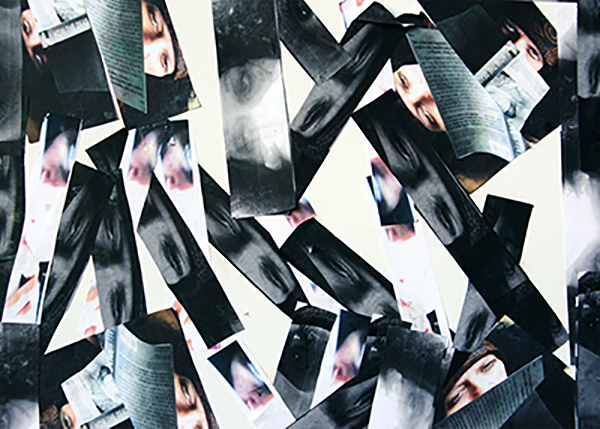With Open Eyes: Returning to an Academic Life
DOI:
https://doi.org/10.18432/R2T928Keywords:
Concussion, Mild Traumatic Brain Injury, Poetic inquiry, Language and Literacy Education, Narrative inquiry, Academic lifeAbstract
When asked to find a visual expression of my writing process for a first year PhD writing class, I saw a chance to unblock whatever was making it difficult for me to write. Searching for a meaningful way into my story, my ideas were reflected back through images of eyes – the eyes of strangers, my own eyes, and finally through the eyes of those who cared about me. Four years after a Mild Traumatic Brain Injury impacted my life, I returned to pursue an academic career. Symptoms that I thought had been put to rest were once again haunting me and my frustration level was escalating. Trying to find my way back into an academic existence was not an easy journey. The visual inquiry into eyes became a door through which I was able to gain back my words. Using poetic and narrative inquiry allowed for a further opening of releasing obstructions.References
Allen, P. B. (1995). Art is a way of knowing. Boulder, CO: Shambhala Publications.
Banks, S. (2008). Writing as theory. In J. G. Knowles & A. L. Cole (Eds.), Handbook of the arts in qualitative research (pp. 155-164). Thousand Oaks, CA: Sage Publications.
DeLozier L. (2009, April 19). Catch your tears. Novel pastimes book reviews and more [Web log] Retrieved from http://www.novelpastimes.com/2009/04/catch-your-tears.html
Gee, P. J. (1989). Literacy, discourse, and linguistics: Introduction. Journal of Education, 171(1) 5-176.
hooks, b. (1999). remembered rapture: the writer at work. New York, NY: Henry Holt and Company.
Leggo, C. (2008). Astonishing silence, knowing in poetry. In J. G. Knowles, & A. L. Cole (Eds.), Handbook of the arts in qualitative research, (pp.165-174). Thousand Oaks, CA: Sage Publications.
Ponte, C. D. (1997). The road to academic success is paved with blood, sweat, and tears. The Annals of Pharmacotherapy, 31(6), 788-789.
Prendergast, M. (2009). “Poem Is what?” Poetic inquiry in qualitative social science research. International Review of Qualitative Research, (1)4, 541-568. Retrieved from
http://www.jstor.org/stable/10.1525/irqr.2009.1.4.541
Rhodes, L. S. (2011). Poetry writing as a healing method in coping with a special needs child: A narrative perspective. Journal of Poetry Therapy, 24(2), 117-125.
Sinner, A., Leggo, C., Irwin, R. L., Gouzouasis, P., & Grauer, K. (2006). Arts-based educational research dissertations: Reviewing the practices of new scholars. Canadian Journal of Education, 29(4), 1223-70. Retrieved from http://journals.sfu.ca/cje/index.php/cje-rce/article/view/2939
Schell-Word, C. (2008). Sawdust for brains: Definition and disconfirmation after mild traumatic brain injury. Journal of Personal and Interpersonal Loss, 4(4), 345-360. http://dx.doi.org/10.1080/10811449908409741
Sokolowski, R. (2000). Introduction to phenomenology. Cambridge, UK: Cambridge University Press.
Van Manen, M. (Ed.) (2002). Writing in the dark phenomenological studies in interpretive inquiry. London, ON: The Althouse Press.
Wilensky, P. (2008). Pursued by Demons, Held by Angels: A Handbook for Adult Children of Alcoholics (ACOA) and Adult Survivors of Narcissistic Parents (ASNP).
Published
How to Cite
Issue
Section
License
Copyright (c) 2017 Art/Research International: A Transdisciplinary Journal

This work is licensed under a Creative Commons Attribution-NonCommercial-NoDerivatives 4.0 International License.
Authors who publish with Art/Research International agree to the following terms:
a. Authors retain copyright and grant the journal right of first publication and the right to sublicense the Contribution, in the form in which it is published by the journal, to others under the terms and conditions of the of the Creative Commons Attribution-NonCommercial-NoDerivs (CC BY-NC-ND) that allows others to download the work and share the work with others with an acknowledgement of the work's authorship and initial publication in this journal, but they cannot change the work in any way or use any part of the work commercially.
b. Authors are able to enter into separate, additional contractual arrangements for the non-exclusive public distribution and display of the journal's published version of the work (e.g., post it to an institutional repository or publish it in a book), with an acknowledgement of its initial publication in this journal.
c. Authors are permitted and encouraged to post their work online (e.g., in institutional repositories or on their website) prior to and during the submission process, as it can lead to productive exchanges, as well as earlier and greater citation of published work (See The Effect of Open Access).
d. Authors wishing to include items (such as images or other media, or any creative works of others whether previously published or not) must contact the original copyright holder to obtain explicit permission to publish these items in Art/Research International. Writing permission should include: the title(s) of any copyrighted work, original place of publication if applicable, and an acknowledgement of having read Art/Research International's copyright notice. Authors are responsible for obtaining this permission and keeping it in their own records for later verification.



